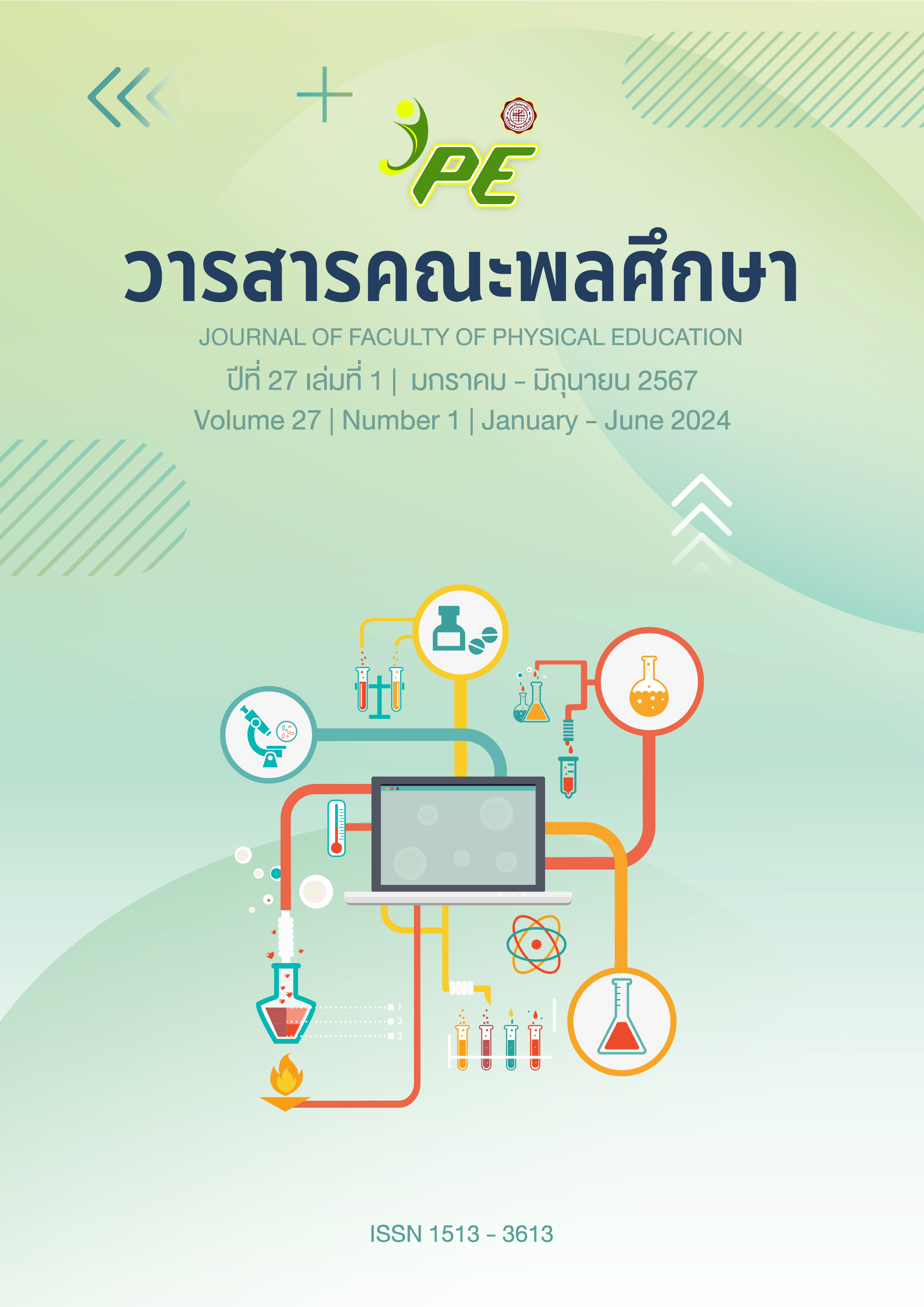EFFECTS OF INTEGRATED PHYSICAL EDUCATION ACTIVITIES USING LEARNING ON FUNDAMENTAL MOVEMENT OF PRESCHOOL CHILDREN
Main Article Content
Abstract
This research aims to study and compare the effects of integrated physical education activities on the basic movement skills of preschool children. The population used in the study consisted of students at the preschool level of Sarasas Witaed Ratchaphruek School, Semester 2, Academic Year 2565, Bangkok, totaling 272 individuals. The sample group comprised 34 preschool students who scored no more than 4 points in the test of four basic movement skills: walking, running, jumping and ball catching. The sample was selected using purposive sampling, divided into two groups: an experimental group of 17 students who received integrated physical education learning and a control group of 17 students who received regular physical education learning.
Data collection tools included the integrated physical education learning plan with validity (IOC = 1.0) and efficiency (E1/E2 = 81.90/82.70), as well as the test of four basic movement skills for preschool children with reliability (IOC = 0.97) and confidence (r = .81). The research was conducted over 8 weeks, with sessions held 3 days per week, each lasting 30 minutes. The movement skill tests were administered before training, after 4 weeks of training, and after 8 weeks of training. Data were analyzed using mean, standard deviation, and one-way ANOVA to compare the mean scores of basic movement skills before training, after 4 weeks of training, and after 8 weeks of training within the experimental group, with statistical significance set at .05 level.
Results of research
(1) The comparison of the average scores of basic movement skills between the experimental group before and after training at weeks 4 and 8 showed statistically significant differences at the .05 level, except for jumping skills before and after training at week 4, and ball catching skills before and after training at week 8, which did not differ significantly.
(2) The comparison of the average scores of basic movement skills between the experimental group and the control group after training at week 4 showed no significant differences for any item. However, after training at week 8, all items showed statistically significant differences at the .05 level, except for jumping skills, which did not differ significantly.
Article Details

This work is licensed under a Creative Commons Attribution-NonCommercial-NoDerivatives 4.0 International License.
Any articles and comments This journal is the opinion of the author. The Faculty of Physical Education doesn't always have to agree. Anyone wishing to publish or distribute a message must obtain direct permission from the author.
References
Altinkok, M. (2016). The effects of coordination and movement education on preschool children’s basic motor skills improvement. Universal Journal of Educational Research 4(5): 1050-1058,2016.
Charoenchaipinan, J. (2017). The development of physical education program for teachers who does not have a degree physical education on primary education level. Dissertation, Ed.D. Health and Physical Education Graduate School, Srinakharinwirot University Bangkok.
Cheloh N. (2020). Learning Experience Design Using Movement and Rhythm Activities to Develop Leadership Traits in Kindergarten Year 3 Children. Journal of Education Technology and Communications, Mahasarakham University. 3(8): 55-67.
Michael, J., Emma L. J., & Samuel, W. (2017). The effects of 10-week integrated neuromuscular training on fundamental movement skills and physical self - efficacy in 6 – 7 year-old children. School of Life Sciences, Coventry University, Coventry, United Kingdom.
Miklánková L. (2018). Education of Children in the Area of Physical Activities as a Foundation for Lifelong Sports. [Online]. Availble from: https://www.researchgate.net.
Ministry of Health. (2018). Board of physical activity promotion program development, physical activity promotion plan B.E. 2018-2030. Bangkok : NC Concept. Ltd.
Office of the Health Promotion Fund (2022). "Manual for Promoting Physical Activities in Children through ACP Concept" in English.http://resourecenter.thaihealth.or.th.
Penglee N, (2019). Effect of Fundamental Movement Skill Program on Motor Skills of Preschoolers . Journal of Education Studies, 47 (3), 196-216.
Pilvas N. (2018). Fine-Motor Development Activities. Retrieved on 24 Nov. 2022 from WWW.taamkru.com/th/fine-motor development activities/.
ThaiHealth.(2019). Exercise for young children.https://www.thaihealth.or.th/?p=227799
Tunthong K. (2019). The Body Movement for The Muscle Structure Development in The Primary Children by Dancing Activity. Bangkok: Faculty of Fine and Applied Arts Rajamangala University of Technology Thanyaburi.
Wattanapa Y. (2019). The development of throwing movement program for enhancing skilled psychomotor domain of undergraduate students in physical education major. Dissertation. Ed.D. Health and Physical Education Graduated School, Srinakharinwirot University, Bangkok.
Office of the Health Promotion Fund (2022). "Manual for Promoting Physical Activities in Children through ACP Concept" in English.http://resourecenter.thaihealth.or.th.


